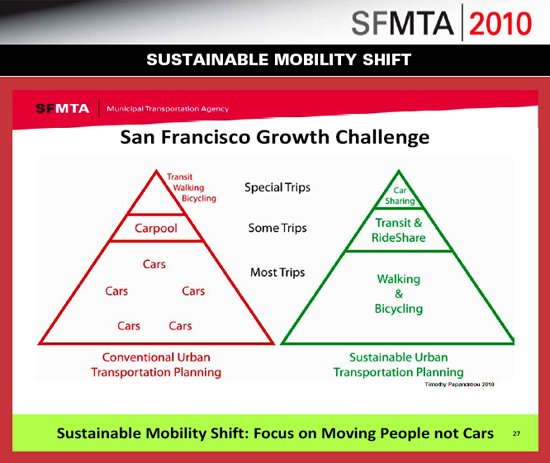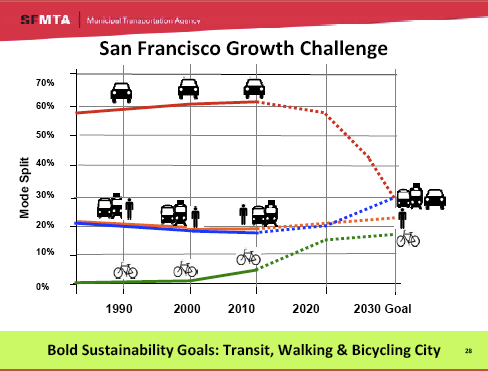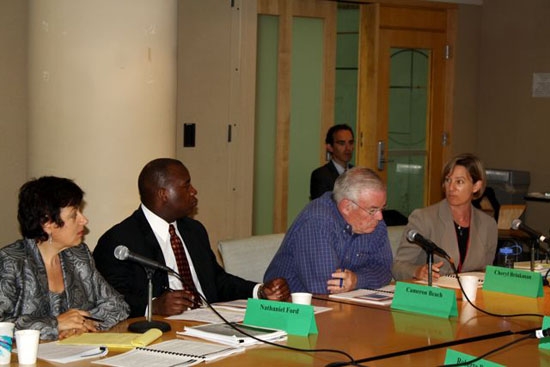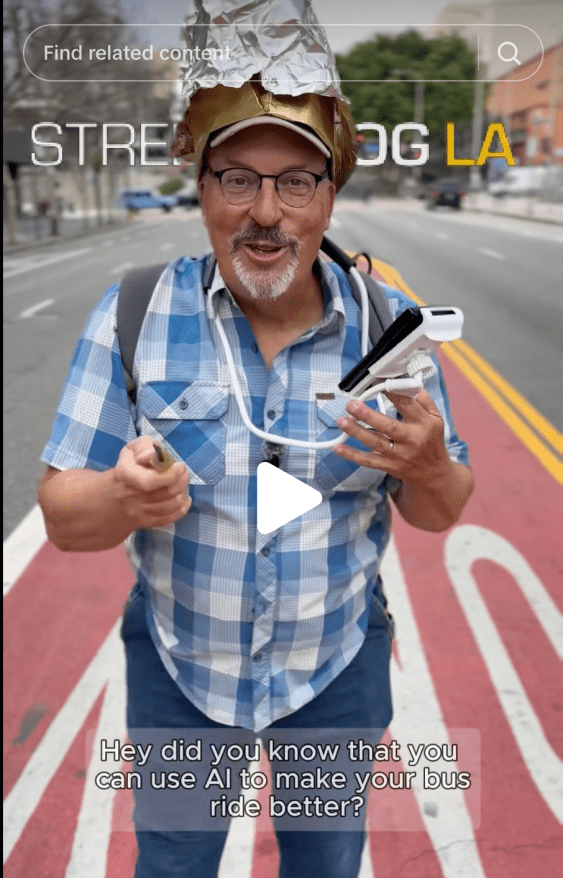
SFMTA Chief Nat Ford presented his "State of the SFMTA" [pdf] report to the board of directors at a special workshop today, a mostly glowing assessment of the past few years but one that acknowledged the pains of its funding crises and the many challenges the agency faces as it looks to the future.
It was also the beginning of a process to update the SFMTA's strategic plan and set a framework that will guide its sustainable transportation policies and goals.
"We are working hard to shift from planning for cars to planning for people," said Ford, reading from prepared remarks. "Like the FDA's food pyramid, too many carbs are not good for you. And so it is true for the mobility pyramid. Too many cars are not good for our city."
Ford pointed out that San Franciscans account for the majority of auto trips being made, particularly within the northeast part of the city, but that overall vehicle miles traveled is down because of the economy.
A slide of the SFMTA's mobility pyramid was displayed to the board which showed that the city would need to liberate itself from the private automobile, converting a vast majority of trips to walking and bicycling followed by transit, rideshare and car sharing. The pyramid was prepared by the SFMTA's Deputy Director of Planning Timothy Papandreou.
"As it relates to a sustainable mobility goal, we need to advance from a 65 percent auto, 15 percent transit, 20 percent pedestrian/bicycle mode split to a 30 percent auto, 30 percent transit and 40 percent pedestrian/bicycle mode split to help with congestion and create a greener, healthier San Francisco, " said Ford.
He said land use and infrastructure alone would not meet the goals by 2030, and a concerted effort would need to be made related to "parking, road pricing and other measures."

The sustainable pyramid did not include private autos, which provoked skeptical responses from some directors, who called the goal of walking and biking as the dominant modes "unrealistic." The remarks were prompted by a question from Bonnie Nelson of Nelson/Nygaard, who was moderating the workshop.
"Everything in the strategic plan derives from this vision," said Nelson, referring to the mobility pyramid. "Is this the vision that you share for San Francisco, or are there things that you feel need to be thought about more carefully as the staff begins developing their more detailed goals in the strategic plan?"
Referring to the omission of private autos, Chair Tom Nolan remarked: "I'm not sure this would be widely supported in the city of San Francisco. You remember all the struggles we've had with the whole issue of trying to extend parking to the evening hours. That's a very strong voice that was heard. People are going to continue to take their cars."
"I share that view," Director Malcolm Heinicke chimed in. "I think the notion that most trips in San Francisco are going to be taken by walk or bike is certainly aspirational if not super aspirational."
"We want to be aspirational but not delusional," Nelson responded to a chorus of laughter.
"Now that's the humorous point," Heinicke went on. "Now I consider myself a pretty, you know, relatively transit first person, but we have to use our car. I mean, my wife can't get our infant to the pediatrician by transferring on three bus lines."
Heinicke said "motorists have rights too and we are the agency that oversees parking, traffic regulation and motorists and I am not only concerned that a vision like this is unrealistic but that it also sends a message of hostility and indifference to motorists."
Director Bruce Oka said he mostly agreed with Heinicke but believed driving is not a right.
"You really don't need to drive if you live in a city. Our transit system would get you almost anywhere you need to go," said Oka. "If we all learn, hey, I'm going to take my car maybe twice a week instead of four times a week. That helps, okay, and I don't see enough of that happening."

Cheryl Brinkman, a transit advocate who is a new member of the SFMTA Board, said she would like to see the transit block on the pyramid a little bigger.
"I like the sustainable transportation urban pyramid. I do agree that private autos are always going to have a little place at the top there," said Brinkman. "I don't think that cars are necessarily the most amazing and best choice for transportation. It's just that we've conspired for 50 years to make them that."
Brinkman said the goal would be not to make driving the convenient choice and that the strategic plan was a great opportunity to help make a shift to walking and bicycling. She noted that she is seeing a dramatic mode shift among families who are using bicycles to get their kids to school.
"If we have physically separated bike space for families and for children they're going to be out there using it. I mean, Sunday Streets is a great example. We provide the space and boom, they're out there."
Although the goals will likely be revised based on the directors feedback, the SFMTA is encouraging the public to provide its own feedback by going to the agency's website and taking a survey and outlining priorities. The SFMTA will begin to finalize the plan in the coming months.
Today's state of the SFMTA report coincided with Nat Ford's annual performance review, which the board discussed in closed session. Ford, the city's highest paid employee, agreed to give back some of his salary last year and a raise is not currently being considered. There are also reports that he is also being wooed for the top transit job in Washington D.C.




